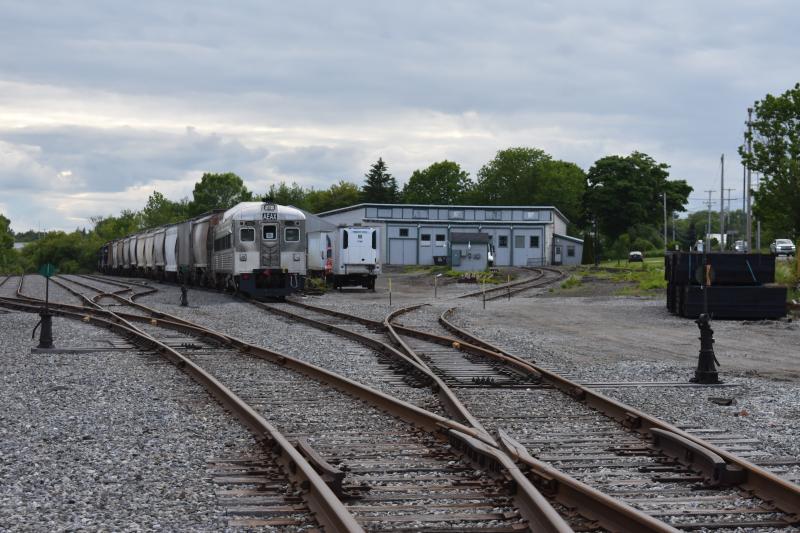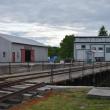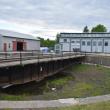ROCKLAND — Could this be the end of rail service in Rockland?
The last sizeable load of freight departed from Rockland’s Round House station Tuesday, June 11, with an expected whistle time of around 8:30 a.m. Though new to the area, and only used a few times as demos, the last in line, a Bud car, has the unfavorable distinction of possibly representing the very last of passenger service to this area.
“This is a sad day,” said Tim Chalifour, who has worked for the local railroad, Midcoast Rail Service for approximately a year.
That last big load of Dragon Cement Company freight, which was still not large enough to fill all of the cars, is headed to Brunswick for distribution. The passenger car, introduced to Rocklanders last summer with demo excursions and high hopes of re-energizing passenger rail travel, is being returned to its owner in Vermont.
The Round House will remain open, and there’s always potential for other companies to bring rail. But Dragon was by far the largest user of the tracks, and though the cement company may still come and go with much smaller inventory, the major traffic of yore is likely at a terminus.
Left behind will be the Round House – the site between New County Road and Park Street (Route 1) – where the turntable was built in 1921, and trains have been chugging into and out of Rockland since 1871 . That site, with its upper yard and lower yard, is known as the most complete train station remaining in Maine.
With Dragon reorganizing its priorities, their freight line has idled. And with the Bud car owners (AmeriStarRail) expecting to pay most of their debts by hauling some of that freight, their dreams of passenger service to Rockland couldn’t keep up.
The current branch of the railway line is owned by the State of Maine and operated by a contract operator Midcoast Railservice. On April 18, 2024, AmeriStar Rail (the Bud car) said that its plans for train excursions on the Rockland Branch in 2024 had been rejected by Midcoast Railservice in favor of Amtrak service. AmeriStarRail had planned to begin operation of 6 roundtrips trains daily by May 1 with Motorcoach Excursions to also connect Boston and Acadia National Park with Midcoast Maine train excursions and tourist attractions.
At this time, Amtrak has not extended rail service beyond Brunswick.
“If Amtrak service fails to start or runs out of operating subsidies, AmeriStarRail is interested to begin operation of its Motorcoach/Train excursions in 2025 without the need for operating subsidies,” said AmeriStarRail, in April.
Charlie Grover, a liaison for the Town of Thomaston, has been meeting quarterly with a representative for Dragon Cement. On May 28, 2024, Grover told the Thomaston Select Board that the market that Dragon serves out of Thomaston is a very strong market, with no signs of weakness. Simply, Dragon’s model changed. No longer a manufacturing model, the company has turned to a distribution model instead.
The objective of the project is not manufacturing, but to have a full-time terminal in Thomaston, with the eye of distribution to their market: Boston and southern New Hampshire area.
Sales have taken place for the new model and new equipment is coming in. To deal with their 40 to 150 pound bags of cement, they need a machine to carry the bags, a machine to empty, and a machine to put them where it belongs in order to be distributed.
Grover was told that the main reason that Dragon changed models was that the cost of doing business was prohibitive. Their costs in the last three years have increased 2.5 times, mostly related to energy costs. At one time, Dragon imported propane and electricity. The winter peak rates are more expensive than the summer rates. At their highest rate, Dragon has paid 15 cents per kilowatt hour.
“That’s very high,” said Grover. “And they just can’t do it, so they changed the model.”
Through it all, though, they have said that they have no intention of leaving.
Yet, intentions can change.
A long time ago, the Cobb Company tried to experiment with a cement kiln on Mechanic Street, overlooking South Cove. They found that they couldn’t compete with the British ships that brought cement and undercut the price.
Trolley service had its heyday, building rail lines in many directions, and powering them from a powerhouse at Glen Cove.
And then, automobiles arrived. And the tracks faded away.
Reach Sarah Thompson at news@penbaypilot.com














































